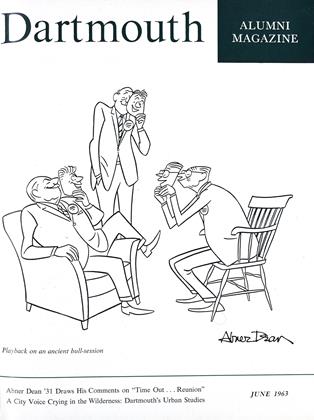FIVE young Dartmouth alumni share in the achievement of the United States expedition's triumph in reaching the summit of Mt. Everest, the world's highest. One of the five, however, will not return with the expedition, for he was tragically killed by a sudden icefall and lies buried by ice on the mountain.
The accident that took the life of John E. "Jake" Breitenbach '57 occurred on the Khumbu icefall on March 23, about midway between the February 23 date the expedition left Katmandu, Nepal, to start the climb and the May 1 date the 29,028-foot peak was first reached by the Americans. Breitenbach, who had twice climbed North America's Mt. McKinley, was from Jackson, Wyoming.
Other Dartmouth men on the expedition were Barry C. Bishop '53 of Washington, D. C.; J. Barry Corbet '58 of Jackson, Wyo.; Dr. David L. Dingman '58 of Baltimore, Md.; and Barry W. Prather '6l of Ellensburg, Wash. Fifteen other mountaineers who when not climbing mountains are scientists, college professors, cameramen, writers, doctors, and one British Army officer made up the U. S. expedition.
The expedition, financed by the National Geographic Society with a $326,000 budget, had 30 Sherpa guides and 900 porters carrying 25 tons of equipment when it left Katmandu. The base camp was set up on the Khumbu glacier and its advanced base camp on the top of the Khumbu icefall which claimed Breitenbach's life. Camp 4 was at 24,800 feet and Camp 5 at 26,000. Camp 6, from which the final assault was made, was at 27,800, according to a news dispatch from Nepal in The New York Times.
Bishop withdrew from College during his freshman year because of illness. He later completed his undergraduate edu- cation at the University of Cincinnati where his father was dean. He has an M.A. from Northwestern and is now em- ployed by the National Geographic So- ciety. Bishop was on the second assault team for the final climb if the first team of James Whitaker and a Sherpa guide had not made the ascent successfully.
Dingman is a veteran of several Alaskan and South American expeditions and was with the party which successfully climbed Masherbrum Peak (25,660 feet) in Pakistan. After his junior year at Dartmouth he transferred to the University of Michigan where he received his M.D. degree. Corbet, a mountain guide and ski instructor, teaches university extension courses in mountaineering, and is a past president of the Dartmouth Mountaineering Club.
Prather, another man who left before graduation, is an aeronautical engineer who serves as assistant in glaciology study. He has been mountain climbing since his boyhood in the western part of the State of Washington. While at Dartmouth he met Dr. Maynard M. Miller, an associate professor of geology at Michigan State University and another member of the expedition, with whom he made several Alaskan glacial studies.
A report from the expedition on the mountain at the time of the writing of this article was that another assault of the peak would be attempted with Bishop as one of the assault team.
 View Full Issue
View Full Issue
More From This Issue
-
 Feature
FeatureAs the Century Turned
June 1963 By Edward Connery Lathem '51 -
 Feature
FeatureA CITY VOICE CRYING IN THE WILDERNESS
June 1963 By H. WENTWORTH ELDREDGE '31 -
 Feature
FeatureNine of Dartmouth's Distinguished Professors Retire on June 30
June 1963 -
 Feature
FeatureTIME OUT ... REUNION
June 1963 By Abnez Dean -
 Class Notes
Class Notes1931
June 1963 By WILLARD C. WOLFF, WILLIAM T. WENDELL -
 Books
BooksLew Stilwell: A Fine Teacher
June 1963 By JAMES L. MONTAGUE '28
Article
-
 Article
ArticleChanning H. Cox '01 Gives Fund to Support Dartmouth's Libraries
MAY 1966 -
 Article
ArticleTwo Books on Teaching English Result from 1966 Dartmouth Seminar
FEBRUARY 1968 -
 Article
ArticleAcid Clouds
MARCH 1983 -
 Article
ArticleDownhill At 50
Jan/Feb 2007 By Brian Schott '93 -
 Article
ArticleWDBS
May 1950 By DICK T. HOLLANDS '50 -
 Article
ArticleOuting Club Ski News
January 1936 By R. P. Fuller '37, Peggy and Fordy Sayre

